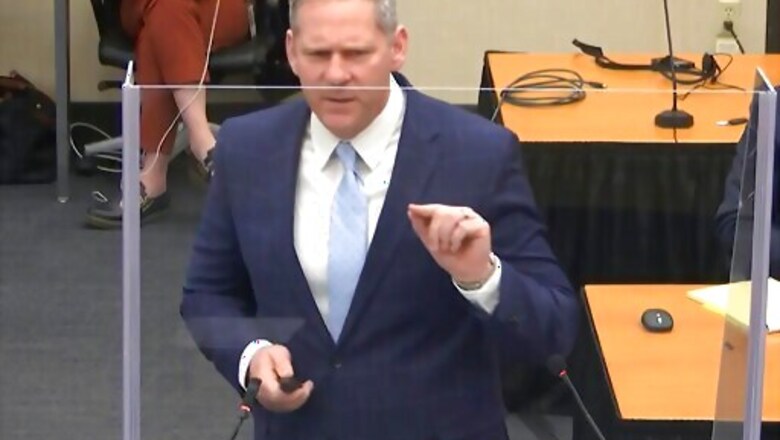
views
CHICAGO: The effect George Floyd’s drug use had on his health and his death remained a key thread as attorneys delivered closing arguments Monday in the murder trial of former Officer Derek Chauvin.
Chauvin’s defense attorney has repeatedly argued that Floyd’s death was caused by his use of illegal drugs and underlying health conditions, while prosecutors worked to convince jurors that Chauvin killed the Black man by pressing his knee into Floyd’s neck for about 9 1/2 minutes.
Chauvin, 45, is charged with second-degree murder, third-degree murder and second-degree manslaughter.
Here’s a look at what each side want jurors to remember regarding Floyd’s use of methamphetamine and fentanyl:
WHAT DID PROSECUTORS HIGHLIGHT?
Prosecutor Steve Schleicher reminded jurors that prosecution witnesses with expertise on the lungs, heart and emergency medicine all agreed that Floyd did not die of an overdose or because of his drug use.
The experts all agree and the videos show that George Floyd did not die the way someone who dies from a fentanyl overdose dies, Schleicher said. His breathing, it didnt slow down. He didnt fall asleep. He didnt go into a coma. No, this looked nothing like a fatal fentanyl overdose.
Floyd had an addiction to painkillers, and prosecutors addressed it by calling his girlfriend Courteney Ross to the stand. Ross described addiction as a lifelong struggle” for her, one that Floyd shared throughout their relationship.
She also testified that Floyd required medical treatment after an overdose in March 2020 and she believed he began using again about two weeks before his death last May. Experts called by the state said regular use could have increased Floyd’s tolerance.
An autopsy found methamphetamine and fentanyl in Floyds system at the time of his death. Investigators also found pills contained methamphetamine and fentanyl inside Floyds SUV and the backseat of a squad car officers tried to push him into.
Schleicher pointed jurors toward the testimony of a forensic toxicologist who found fentanyl levels were well below the ratio of people who die from an overdose and a very low level of methamphetamine in blood taken from Floyd at the hospital.
Schleicher also played body camera footage of Chauvin telling a bystander that Floyd looked like he’s probably on something.
Drug use may be a risk to police interacting with someone, but it’s not a threat and doesn’t make Chauvin’s actions reasonable, Schleicher said.
During the prosecutions rebuttal argument, prosecutor Jerry Blackwell also questioned why the defense focused on pills found in Floyds car and the police car when lab tests show what was actually in the mans system.
What is the point? Blackwell said, adding that jurors can decide that for themselves. And you keep hearing drugs in the car, drugs in the car. And the drugs were one pill. One. One pill that was not in George Floyd.
WHAT DID THE DEFENSE HIGHLIGHT?
Defense attorney Eric Nelson incorporated drug use into his central argument that Chauvin responded as a reasonable officer would to a large man struggling with other officers.
The initial call to police reporting Floyd was suspected of passing a counterfeit $20 bill at Cup Foods also reported he was possibly under the influence of alcohol or something else,” Nelson said.
Chauvin arrived as two other officers struggled to get Floyd into the back seat of a squad car, and Nelson argued a reasonable officer would have noticed white foam around the man’s mouth.
Chauvin then tried to help the two rookie officers to get Floyd into the car and they were still unsuccessful. A Minneapolis use-of-force trainer testified that officers are instructed that people under the influence of certain drugs can become stronger than they normally would, Nelson said.
After displaying photos of the pills found in the back of the squad car and in Floyds SUV, Nelson told jurors that even a small amount of fentanyl can be deadly. The two people in the car with Floyd reported that the man seemed to fall asleep just before police arrived, he added.
But Nelson later acknowledged that millions of Americans have dealt with opioid addiction, telling jurors he only intended to examine how the man’s body typically reacted to drugs not to question Floyd’s character.
Nelson said he was not suggesting that Floyd died of an overdose alone but that it contributed along with his existing heart disease following a physical struggle with police.
He urged jurors to focus on Dr. Andrew Baker’s testimony the chief medical examiner for Hennepin County was the only expert to examine Floyd’s body and disagreed with the other state-called witnesses who found Floyd died of asphyxia, or lack of oxygen.
The state experts’ dismissal of the possibility that drug use played a role in Floyd’s death is preposterous, Nelson said.
No single factor, one over the other, played any more … of a role resulting in Mr. Floyds death, Nelson said. (Dr. Baker) said his heart simply couldnt handle it, within the context of the subdual and restraint. Apparently the state, as they just argued, wants you to believe what you see. And they did not like Dr. Bakers conclusions.
___
Find APs full coverage of the death of George Floyd at: https://apnews.com/hub/death-of-george-floyd
Disclaimer: This post has been auto-published from an agency feed without any modifications to the text and has not been reviewed by an editor
Read all the Latest News, Breaking News and Coronavirus News here. Follow us on Facebook, Twitter and Telegram.


















Comments
0 comment